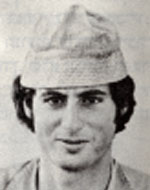Aharon (Araleh), son of Shulamit and Shmuel, was born on 26.3.1946 in Kibbutz Yagur and passed all the stages of the growth and education of a kibbutz member: the nursery, the kindergarten, the elementary school, Middle School. “He was a dreamy child,” his friends say. “He was sitting in the classroom, half wondering, perhaps scribbling something for himself, different from others and reclusive – impossible to grasp in the general order, and always filtering his own way within the agreed framework.” Although he was a member of the Hanoar Haoved movement, like all his friends, Aharon was not all. He was not interested in sports, and he did not like the social “games.” He preferred to read a good book, let alone listen to music – all music – from classical to pop. Aharon was drafted into the Israel Defense Forces in early November 1965, underwent a platoon commander’s course and later served as a noncom in the Armored Corps. Later, after receiving an officer’s course, Aaron contracted severe hepatitis and was transferred to a non-combat unit, despite repeated and tireless attempts to return to his unit. Nevertheless, Aaron, in his new unit, also received a special promotion to the rank of sergeant, after his commander recommended him as a soldier who was doing his job in the best possible way. He participated in the Six-Day War and was discharged from regular service in early November 1968. His release certificate read the following words: “An exemplary soldier with excellent organization.” Aaron was the center of the cotton industry. “When Aaron took over the cotton industry, he appeared to have been caught naked and unprotected into a Aryeh’s den, the cotton field was full of bumboys, and suddenly one of the shy, silent people who liked him but did not appreciate his strength came to us. A little time to recognize the energetic forces that were hiding under this quiet seclusion. ” Aaron devoted all his time, and much more than necessary, to cultivating the industry. He initiated new work processes, developed advanced patterns of thought, collected data on industry-related issues, solved troubling problems, and established a professional library on cotton. In particular, he excelled in his human approach to his colleagues, and was indeed appreciated and unreservedly by them, and even for great help. The industry expanded, the team consolidated into one entity, and economic achievements grew unprecedented. His friends said: “The foundations laid by Aaron were so strong that until now the industry continues to operate in the way it has outlined.” Only as a reservist did Aharon succeed in returning to his original unit, which became a unit of volunteers for special operations. In the Yom Kippur War, Aharon fought in the ranks of the company of volunteers for special operations, which was among the people crossing the canal. On the 19th of Tishrei 5740 (19.10.1973), in a daring operation of the unit west of the Suez Canal, Aaron fell. He was buried in the cemetery of Kibbutz Yagur. He was survived by a father, a mother and three sisters. After his fall, he was promoted to First Sergeant. In a letter of condolence to the bereaved family, his commander wrote: “Aharon performed his duties efficiently and with dedication. His words are reminiscent of Aharon: “A few typical notes to Aharon: slow swaying motion, delicate movements, quick speech as if he were running after his thoughts, a light whistle, a thin, refined humor that you did not notice until you knew Aharon. In the army and in the agriculture, among the rich, but with his tremendous intellectual power and inner inner powers – those that were not visible – he always took his place quietly, modestly, peacefully. ” Aaron’s agriculture and parents published a pamphlet in his memory, in Hebrew and English, with the words of friends about his character; Yogur was also included in the diary.
